With all of these moves towards digital delivery in entertainment, we thought it would be worthwhile understanding one of the key items in this process – how to get the digital content to UK households.
Steve Kennedy is an acknowledged expert in the telecoms and data networks field, so it was an obvious choice for us to ask him to write an overview of how other IP operators can compete with BT – by creating their own data network. To do this, they need to put their own equipment into the telephone exchanges that connect to peoples houses. That process is Local Loop Unbundling (LLU).
Over three days we’ll give you a full background in LLU in the UK.
Yesterdays piece gave an overview of LLU and which companies are players in the UK.
LLU Penetration
All the large operators are going into around 1,000 DLEs (those being the most densely populated), since there are only around 1,200 of them, all the operators are targeting the same DLEs and there’s a lot of overlap.
 Since the operators all want to get into the same exchanges, there’s overcrowding and BT have to install new hostel space (the space where operators can put their own equipment into) which causes delays. It can take more than 6 months from when an operator puts an order in to being granted access to an exchange.
Since the operators all want to get into the same exchanges, there’s overcrowding and BT have to install new hostel space (the space where operators can put their own equipment into) which causes delays. It can take more than 6 months from when an operator puts an order in to being granted access to an exchange.
LLU (un)Economics
When LLU was announced it was prohibitively expensive, mainly due to Ofcom (or Oftel as it was then) allowing BT to set the pricing models.
Over time the economics have become fairer to operators, with BT being forced to set-up BT Openreach which looks after the physical infrastructure. If they hadn’t formed Openreach, it’s likely Ofcom would have pushed for a split of BT.
Ofcom then made BT not reduce wholesale pricing for their broadband services to give LLU operators a chance to gain a foothold. BT would have to maintain their pricing until April 2007 or 1.5m unbundled lines, whichever came first.
In Dec 2006 there were 1,000,000 unbundled lines and last week Ofcom announced that 1,700,000 unbundled lines had been reached (there was no distinction between Option 2 and 4). BT Wholesale has over 9m broadband customers.
Also Carphone Warehouse (CPW) released their interim results showing they had 2.31m broadband customers, 700,000 utilising LLU.
So out of the 1.7m unbundled lines, CPW have .7m which means there’s 1m split between the rest (mainly the big players, Wanadoo, C&W, Easynet Pipex and Tiscali).
As a rough model that’s 1.7m lines, spread over 1,000 DLEs which makes 1,700 lines unbundled per DLE. There’s 6 big players which means around 280 customers per operator per exchange.
 Unfortunately the economics of LLU only work if there’s a lot of customers per exchange i.e. massive scale.
Unfortunately the economics of LLU only work if there’s a lot of customers per exchange i.e. massive scale.
Now that the milestone of 1.5m unbundled lines has been reached, BT Wholesale will be allowed to reduce their pricing (which they’ve said they want to do) which will make the economics even worse.
To get the scale, further consolidation will occur which means fewer LLU operators in the future (Pipex has already put itself up for sale with CPW rumoured to be the front-runner for buying them). They need to do this in order to get the customer penetration per exchange.
The next and final section will cover the possibility of competition to BT and what could happen in the future
Images are courtesy of wb-internet and the BBC, respectively.
 Text to Speech (TTS) processing has come on leaps and bounds from the early days of jerky, rough renditions of robotic-type chatter yesteryear.
Text to Speech (TTS) processing has come on leaps and bounds from the early days of jerky, rough renditions of robotic-type chatter yesteryear. Sony and BT have just signed a four year deal to extend the function of the Sony PSP to have it act as a Wi-Fi video and voice ‘softphone’.
Sony and BT have just signed a four year deal to extend the function of the Sony PSP to have it act as a Wi-Fi video and voice ‘softphone’. BT are rather pleased with themselves today as they’ve gained the number one position, as Britain’s most popular broadband retailer.
BT are rather pleased with themselves today as they’ve gained the number one position, as Britain’s most popular broadband retailer. Want a quick recap on how the growth in the access to broadband has gone in the UK?
Want a quick recap on how the growth in the access to broadband has gone in the UK? Much to our surprise, the UK public are starting to be told about the
Much to our surprise, the UK public are starting to be told about the 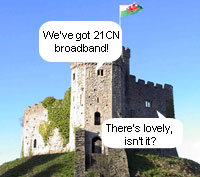 Also a single network would have meant it could go to many more of the 5,600 DLEs than the 1,200 everyone’s competing for at the moment.
Also a single network would have meant it could go to many more of the 5,600 DLEs than the 1,200 everyone’s competing for at the moment.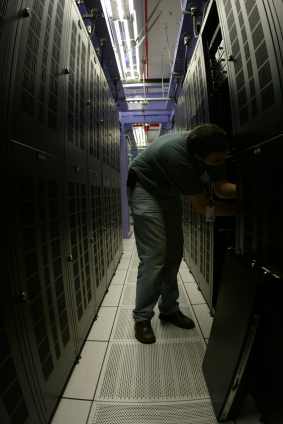 Since the operators all want to get into the same exchanges, there’s overcrowding and BT have to install new hostel space (the space where operators can put their own equipment into) which causes delays. It can take more than 6 months from when an operator puts an order in to being granted access to an exchange.
Since the operators all want to get into the same exchanges, there’s overcrowding and BT have to install new hostel space (the space where operators can put their own equipment into) which causes delays. It can take more than 6 months from when an operator puts an order in to being granted access to an exchange.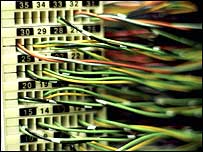 Unfortunately the economics of LLU only work if there’s a lot of customers per exchange i.e. massive scale.
Unfortunately the economics of LLU only work if there’s a lot of customers per exchange i.e. massive scale.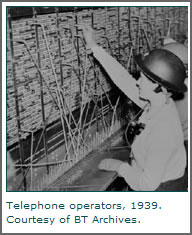 What is Local Loop Unbundling (LLU)?
What is Local Loop Unbundling (LLU)?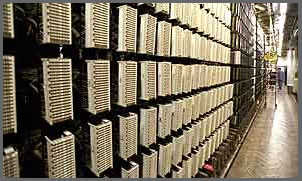 Any operator wanting to offer broadband (and possibly voice) has to put their equipment in these DLEs. However there is a cost to unbundling an exchange (around 100,000 including backhaul) which means operators are only targeting the most densely populated ones.
Any operator wanting to offer broadband (and possibly voice) has to put their equipment in these DLEs. However there is a cost to unbundling an exchange (around 100,000 including backhaul) which means operators are only targeting the most densely populated ones.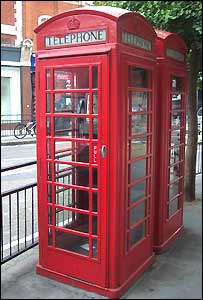 BT is under a legal obligation to provide phone boxes up and down the length of the UK, which they claim numbers 63,795. BT say that 40,500 of these phone boxes are unprofitable.
BT is under a legal obligation to provide phone boxes up and down the length of the UK, which they claim numbers 63,795. BT say that 40,500 of these phone boxes are unprofitable. New figures from research firm Epitiro puts BT as the leading consumer broadband provider for the 4th quarter of 2006 (October-January).
New figures from research firm Epitiro puts BT as the leading consumer broadband provider for the 4th quarter of 2006 (October-January).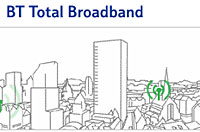 Epitiro’s testing procedure monitors “customer experience” for internet access services, analysing over 622,000 real-time data samples from eleven locations around the UK – meaning that each broadband service was tested around 60,000 times.
Epitiro’s testing procedure monitors “customer experience” for internet access services, analysing over 622,000 real-time data samples from eleven locations around the UK – meaning that each broadband service was tested around 60,000 times. “Speeds have increased from 3817.82 kilobytes per second in the third quarter due to new ADSL Max entrants into the ten largest broadband providers. However it’s unlikely that many ADSL Max services will perform at their full capacity of 8Mbps. The speed of broadband service reduces the further the customer’s connection is from their local telephone exchange,” he added.
“Speeds have increased from 3817.82 kilobytes per second in the third quarter due to new ADSL Max entrants into the ten largest broadband providers. However it’s unlikely that many ADSL Max services will perform at their full capacity of 8Mbps. The speed of broadband service reduces the further the customer’s connection is from their local telephone exchange,” he added.